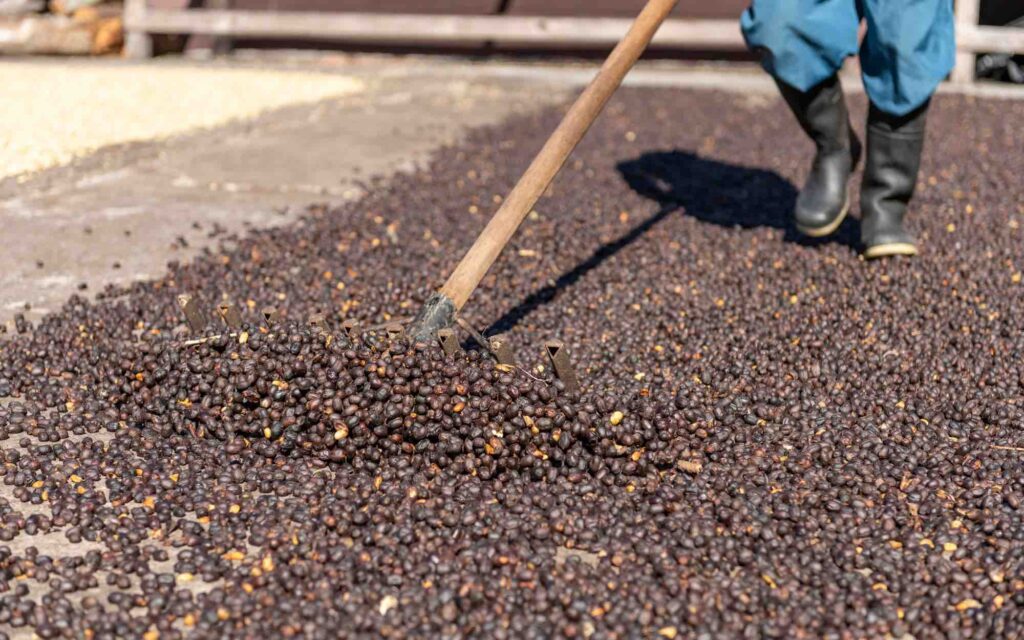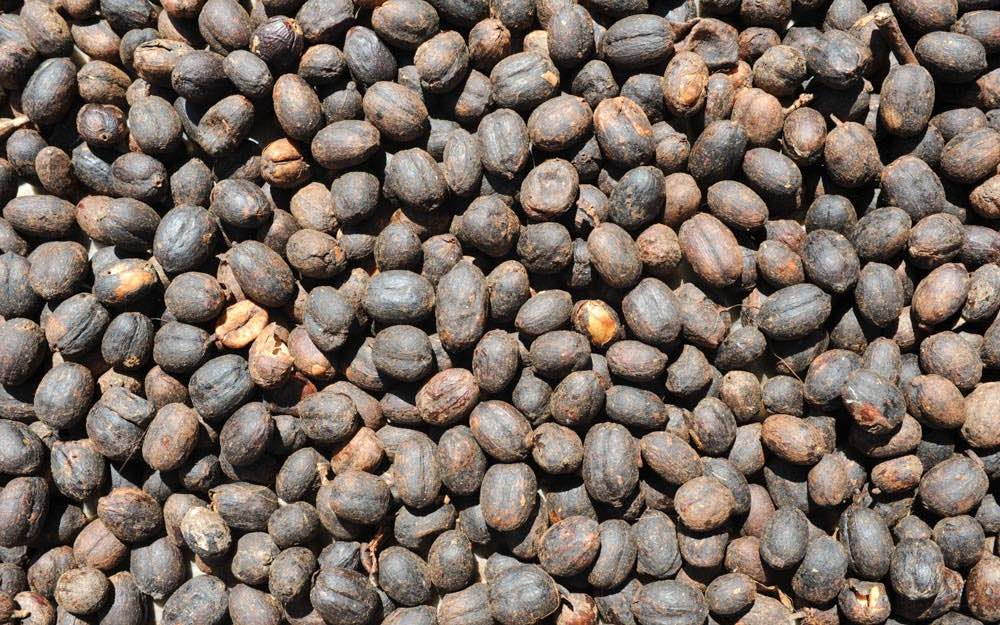Washed, natural, honey, anaerobic fermentation, carbonic maceration. Now more than ever, there is a more diverse range of processing methods in the specialty coffee sector. Each one has its own unique impact on flavour and mouthfeel, with some even helping to improve coffee quality, too.
So considering that different processing techniques have such significant influence over sensory profiles, it also makes sense that certain processing methods work better when paired with different brewing methods.
One example is natural processed coffee and espresso. With natural processing methods resulting in fruitier flavours and a more pronounced body, these coffees tend to work well as espresso.
So, what do coffee professionals need to know when using natural coffees for espresso? To find out, I spoke to Leif An, founder and head roaster at Stereoscope Coffee, and Altuğ Baser, founder and head roaster at BOXX Coffee Roasters.
You may also like our article on coffee roasting and experimental processing methods.

What is natural processing?
First and foremost, let’s break down what natural processing is.
Believed to be one of the oldest processing methods, this technique (also known as dry processing) is relatively straightforward to carry out. However, if not implemented to high standards, it can be difficult to achieve consistently good results with natural processing methods.
Essentially, the process involves a few simple steps:
- After cherries are harvested and sorted, they are placed on raised beds or patios to dry in the sun
- The cherries are left completely intact. This includes the fruit and mucilage (the sticky layer between the outer skin and parchment that surrounds the seed, or bean)
- Farm workers leave the cherries to dry until they reach between 11% and 12% moisture content
- Producers and farm workers need to frequently turn the cherries while they’re drying to avoid mould development
- Once dried, the cherries are depulped and hulled – and turned into green coffee ready for export
It’s safe to say there’s a lot of risk involved with natural processing methods. As this technique so heavily relies on plenty of sunlight and warm, dry weather conditions, the cherries need to dry within a certain amount of time. If not, the chance of over-fermentation increases significantly. This results in more unpleasant flavour notes, including overripe fruit or sour yoghurt. Conversely, the cherries can also dry too much – which can lead to a number of problems, such as uneven roast development.
When done right, however, natural processing methods can create more interesting and “funky” fruit flavours, as well as an enhanced body and velvety mouthfeel. In turn, a growing number of specialty coffee shops and roasters are including more and more natural processed coffees on their menus.

Using natural processed coffees for espresso
Natural processed coffees certainly work well as both filter and espresso. But there are several reasons why the latter brewing method helps to highlight the more desirable characteristics of natural processing methods.
As many baristas know, it can be difficult to achieve consistent results when extracting washed and experimentally processed coffees as espresso. Leif explains that this could be a result of roast profiles.
“It’s usually easier to develop roast profiles for natural processed coffees, more so than washed coffees,” he says. “This means it’s usually easier to replicate flavour profiles.
“With washed coffees, it can be difficult to develop roast profiles enough sometimes,” he adds. “This underdevelopment then affects espresso extraction because the washed process results in brighter and cleaner flavours. It’s harder to dial in these coffees as espresso is more concentrated, so trying to balance out brightness can be trickier.”
Altuğ, meanwhile, tells me how roasting in larger batches can impact roast profile development – and thereby the final cup profile.
“When roasting washed coffee in big batches, you need to roast at higher temperatures,” he says. “Natural coffees, however, require less heat, so they are often easier to roast – which can produce better results when prepared as espresso.”
Both Leif and Altuğ say Stereoscope and BOXX always have a natural processed coffee on bar.
“The flavour profiles of these coffees are more suited to people who are not familiar with specialty coffee,” Leif tells me. “They’re a lot sweeter and fruitier, so it’s like a gateway to drinking more specialty coffee.”

What about milk-based beverages?
In recent years, more and more coffee businesses have started creating roast profiles for milk-based drinks to complement coffee’s inherent characteristics. So considering natural processed coffees already have more prominent sweet flavours, do they pair well with milk?
“Washed processed coffees can sometimes taste astringent as espresso, which can lead to unpleasant flavours when you add milk,” Leif says. “It’s much easier to make a good cappuccino or cortado with natural processed coffees, and the flavours tend to resonate more with customers.”
Altuğ agrees, saying that natural processed coffees often have more lactic flavours and creamier mouthfeel. These sensory descriptors often denote more of the sour and acidic characteristics of yoghurt, which can work with milk-based beverages – as long as the coffee is extracted well.

Tips and advice on using natural coffees for espresso
No matter which processing method is used for a specific coffee, Leif tells me baristas should focus on highlighting its innate characteristics.
“Coffee has unique flavours depending on how it’s grown, processed, and roasted,” he says. “Baristas should focus more on trying to highlight inherent flavours, and not so much on trying to bring out a certain flavour.
“It’s best to cup the coffee to understand its full potential, regardless of which brewing method you use,” he adds.
However, when it comes to natural processed coffee specifically, there are certain factors baristas need to keep in mind.
Based on his experience, Leif says the degassing period for natural coffees usually takes longer than other processing methods. For comparison, he explains that while he finds washed coffees often take about two weeks to fully degas, natural processed coffees will typically degas in about three weeks. This then makes it easier to extract more of the coffee’s flavours.
Tweaking extraction variables
Leif also suggests extracting natural processed coffees as espresso for longer to better highlight sweetness. Moreover, the natural process tends to result in a slightly higher moisture content than washed processing methods, which can impact the solubility of the coffee. In line with this, using a slightly finer grind size can help to achieve better-tasting and more consistent results.
Increasing the yield for natural processed coffees can also produce sweeter and fruitier flavours in the cup. Altuğ suggests starting with a 1:2.5 water to ground coffee ratio, and then tweaking accordingly from there.

Over the past few years, we can see that specialty coffee has certainly embraced natural processing methods. More and more coffee shops and roasters are offering natural processed coffees – both as filter or espresso.
But when preparing as espresso in particular, it’s important to treat natural processed coffees differently to other processing methods. That way, these coffees can truly shine – and customers can potentially experience completely new flavour profiles.
Enjoyed this? Then read our article exploring naturals, pulped naturals, and honey processed coffees.
Perfect Daily Grind
Want to read more articles like this? Sign up for our newsletter!
The post Are natural processed coffees the best choice for espresso? appeared first on Perfect Daily Grind.
By: Yudi GuoTitle: Are natural processed coffees the best choice for espresso?
Sourced From: perfectdailygrind.com/2023/09/natural-processed-coffee-espresso/
Published Date: Mon, 25 Sep 2023 05:29:00 +0000






